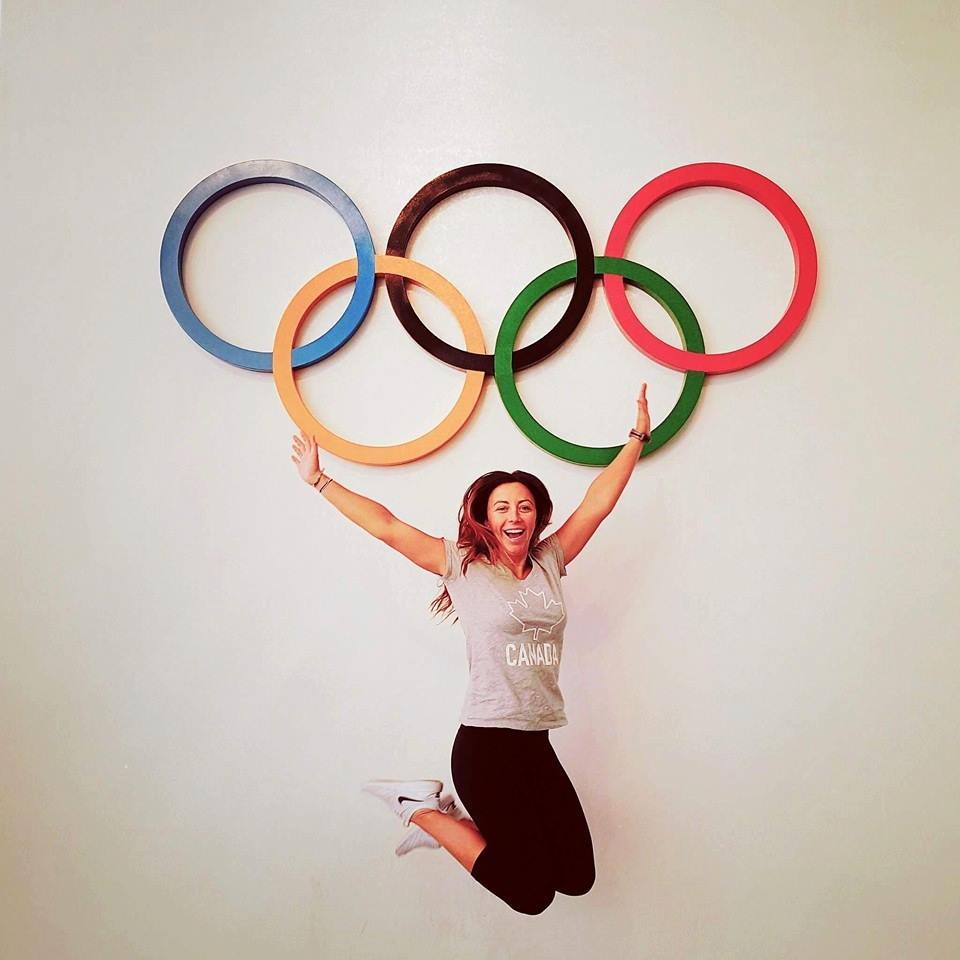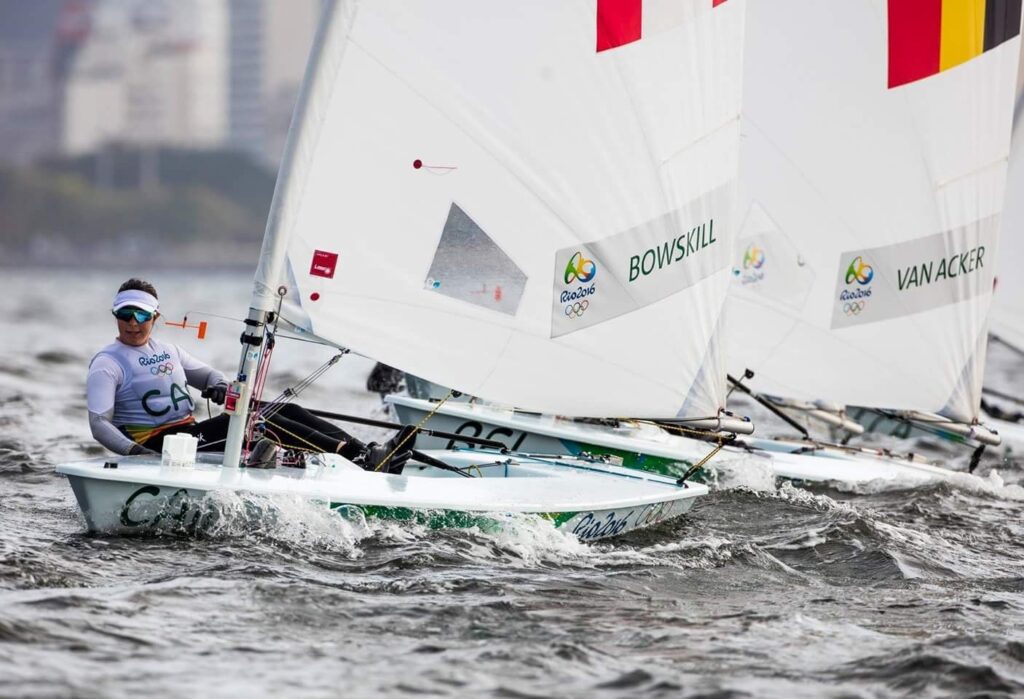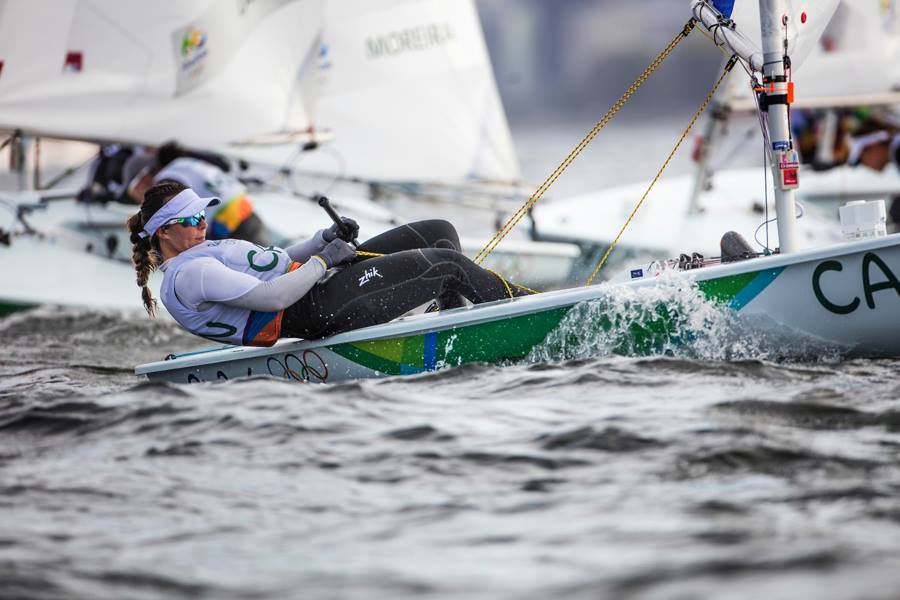Brenda Bowskill is a Canadian Radial sailor who competed in Rio 2016. We catch up with her a few months after the games to hear about the experience as an Olympian Sailor and to see what’s next. Check out her website and follow her Facebook page!
So, a little bit of background. Where and when did you start sailing?

I started sailing when I was 6 at the Queen City Yacht Club, but I moved clubs quite a bit in search of a really good race team. Queen City didn't have a race team, so I went out to Whitby, which is where I lived. Then I moved to Frenchman's Bay, which had a really good race team. I was there for a few years until I was the proper age to go to RCYC [Royal Canadian Yacht Club], which is 16.
And RCYC has been your home club since then?
Yes. They’ve been one of my biggest supporters throughout particularly the Rio campaign, but being at that club even during the London quad when I came in halfway through, three-quarters of the way through. Those girls were on the national team as well, so that gave me a foot into training with the national team.
That's awesome. Why did you start sailing? Was it a family thing? What got you into a boat in the first place?
Yeah, it was a family thing. My grandparents had boats and my step-dad had boats. In the summer months, we would live on them, on the Toronto Islands. Both my parents worked in the city at the time, so they would take the ferry across and go to work and we would go to sailing school, me and my sister, from there. Then one year my mom took me out of sailing and put me into canoe camp just to make sure I was getting to do many different things. I hated canoe camp so much I told her to never take me out of sailing again, and she never did.
Nice. At what point did you decide that you were going to move full-steam ahead with that and put an Olympic goal on the Laser sailing?
I would say when I qualified for Youth Worlds in 2010. I didn't go back for my second term of grade 12 and went to the International Sailing Academy in Mexico to sail in preparation for that.
And fast forward, you made it to Rio. Can you tell us about the Olympic experience?
Yeah, Rio was really cool. I always said ... I'm obviously never going to forget my first Olympics, but I think it was like the five or six years of preparing for the Olympics that I had the most fun.
More of the journey, not the destination, kind of thing?
Yeah, absolutely. For now. I'm obviously not coming home with a medal, so I think if there was a medal that it would be very different. Looking back the Olympics was cool, obviously being able to make it there, but I think I was even more excited when I came top ten at the Worlds. My Olympic trials had another top ten at Weymouth. Seeing that progression, and then also being able to travel the world, make friends everywhere I went to.
How tough was it out on the water during the Olympics? How hard was the racing?

Honestly, you've been racing against those girls for the whole four years. Obviously it was a place where every single top girl was there, so you weren't missing a couple as you could have at a world cup or world championships, but at the end of the day, it was just another regatta. You didn't race against anybody you haven't seen before. Nobody was doing anything crazy at the Olympics. I said to my coaches beforehand, "Should I expect people to totally approach the Olympics differently because it's the Olympics?"
I remember at Weymouth I won the pin every single race for one day that we had three races. It was just like Marit and Evi all of them were kind of not fighting super hard for it, and I was like, "Okay, this isn't going to happen at the games," they're going to go 110% to make sure they win that pin if they have to. I asked all my coaches and they're like, "No, maybe the only thing you'll see different is people acting differently on land," just because of all the distractions. That's essentially what it was. On the water, nobody did anything crazy, so I wasn't caught completely off guard.
When you're there there's obviously a lot more hype and you have the massive opening ceremonies, you're staying in the village, there's probably a lot of security, a lot of procedures for measurement. Everything is a big step up from a World Championships. So what did you draw on to be ready for that?
Having been to the Pan Ams was huge in terms of preparation for the Olympics because if I felt like how I did at Pan Ams going to the Olympics I would have been totally out of my element. The Pan Ams Games in Toronto were a total shock. It’s a multi-sport event, everybody is there, the opening ceremonies, having to eat in the food hall, living in the village, like all that. That was a total shock for me because I had never experienced anything like that before. The Olympics were just the Pan Ams on a larger scale.
And it how did it feel once it the Olympics were over?
Before the Olympics it was standard procedure doing my normal regatta prep, working out, going to bed on time, eating right, etc, etc. Afterward... The last day of racing ... It was like this huge weight just lifted off and I was like, "Oh my gosh we're done."
Everything in my life has been tailored towards the games for the past six years ... It's done, I can just breathe. There's nothing I have to do and I actually had a diet of McDonalds and Fruit Loops for probably a week after.
I finished the regatta and I was kind of like, "Yeah, that's a good result," it's not amazing, but it's not horrible. It's nothing to be embarrassed about. I had some really good, good moments. It's a good platform for 2020.
Then I went and I watched the medal race, and one of my training partners is Anne Marie from Denmark was in it, and Ashley [Stoddart] was in it, Annalise [Murphy] was in it, all my pretty good friends on the circuit were in it, and I was like, "there's absolutely no reason why I can't be out there racing." So I went from being totally content with my results and not rushed to get back to work. And fuck that. I want to be out there. I was super keen, super ready to go.
Once you came back to Canada, I saw you were invited to the CFL game. You threw the first pitch of the Blue Jays game. How was your whole homecoming experience?
It was really cool and super exciting. The CFL game and we also got to go to Lenny Kravitz, which was really cool. We went as a group of Olympians, which was really neat because then you got more personal time to meet the people that live in your area.
It was really cool to be honored as an Olympian, and everybody was so excited to see you, and they didn't even know who you were, and all of that. It was really cool.
Towards the end of the 2016 quad, you moved up pretty quickly in your results in some big events. A top ten finish at Worlds and at Weymouth amongst others. What do you think gave you that boost?
I think we changed a lot of things. We kind of changed our general philosophy of how we approach training and racing. One of the biggest things was we went and got an international training partner, the Danes. We had that relationship, which was really good for both of us. I think we benefited each other, even though I think Anne Marie is way better than I am. That was something that was huge in terms of development. Another thing was making our training a lot more purposeful ... At some point in your development, your priority is simply time in the boat. You need to learn the boat, you need to learn the feel, just do as much as you can sort of thing.
But then there comes the time you've done enough of that and you need to start making it more purposeful. So that's what we did, all of our training was very thought out, had a purpose, had a goal, had a way to evaluate that goal. It just became a lot more quality over quantity, in terms of training.
We also started doing a lot of venue preparation, which was something we never did in the past.
If you want to just tell us a bit about your training. What's the typical training schedule like?

Right now for the next four years, two years will be in school, well at least September to April, and then I'll have my summers to sail full-time. The second two years will be full-time sailing. So we'll probably move somewhere so we can sail basically every day.
While I'm in school a lot of it becomes more off water training, so a ton of time in the gym. So you could say every day, yeah, I'm thinking about sailing because every day I'm either in the gym or doing my recovery. I'm training for sailing, it's not like I'm training just to be generally healthy or generally fit. My programs are specifically tailored to Laser sailing.
Besides an Olympic campaign, there are so many things you have to constantly worry about. Fitness and sailing is just two parts of a many part system, so I have to be in constant communication with our federation, Sail Canada, to make sure that we're communicating to them what type of support we need, we can check in with them and let them know how we're progressing.
Then communicating with my coach to make sure that we know what our next steps are. Am I doing everything that they want me to do while we're not sailing? Then, also, being more senior on the team I think you take on the role of making sure that your training partners are also in the loop of everything. A lot of the logistical planning comes down to me, but I have to make sure that that works okay with everybody else on the team. Making sure that they understand what our goals are, etc, etc.
You've stated you want to not only go to Tokyo, but your goal is to come back with a medal, right? What would you say is one of the biggest things you would need to work on or you want to improve in the next quad to help you achieve that goal?
I think the biggest thing is the race experience. I don't think, for the majority of this past quad, I did enough racing to actually have had a chance to medal at Rio. Also racing in the Olympic venue. That goes back to venue prep.
I think, definitely, the theme for my next four years will be quality training over quantity, and then also basing my training around preparation for regattas. I know how to sail the boat fairly well. Obviously you can keep tweaking that and fine-tuning that throughout the four years. Learning how to race, I think, will be the ... My next big jump for me.
To wrap this up do you have anyone you want to give a shout-out to or thanks to sponsors, friends, family, or anything like that?
For sure. I would like to give out a shout-out to Fogh as one of my sponsors, the Canadian Sport Institute Ontario, Sail Canada, RCYC, and all the team sponsors, Volvo, Helly Hansen. And also just give a shout-out to my family, particularly my Godmother, Elspeth Fanjoy, who has been one of my biggest supporters, and without her, I probably wouldn't have been able to campaign as well as I had these last four years.
Thanks, Brenda!